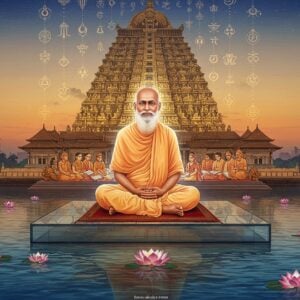Kashmir Shaivism and the Legacy of Abhinavagupta

Kashmir Shaivism, a captivating school of Hindu philosophy, emphasizes the profound unity between the divine and the individual soul. Deeply rooted in Indian culture and spirituality, this ancient tradition offers a unique perspective on the nature of reality and the path to liberation. Abhinavagupta, a revered philosopher and mystic, played a pivotal role in shaping and systematizing its doctrines. Understanding these traditional philosophies provides a deeper connection to India’s rich cultural heritage. For those seeking to deepen their understanding of yoga and spiritual practices, consider exploring our beginner yoga guide: Beginner Yoga: Simple Poses, Easy Introduction.
The Essence of Kashmir Shaivism
Kashmir Shaivism, a distinct branch of Shaivism, seamlessly blends monistic and tantric traditions. Central to its philosophy is the concept of Pratyabhijna, meaning “Recognition.” This concept illuminates the inherent divinity within each soul, emphasizing spiritual practices that lead to self-realization and liberation. It’s a journey of recognizing one’s true nature. Exploring temples and sacred sites can deepen this journey. Explore the Shankaracharya Temple: Shankaracharya Temple: A Complete Guide and Shankaracharya Temple: Spiritual Heart of Kashmir.
Another key philosophical idea is Spanda, the dynamic vibration of consciousness, which distinguishes Kashmir Shaivism from dualistic philosophies. This concept highlights the interconnectedness of all beings and phenomena. These teachings offer a unique lens through which to understand the divine, weaving together philosophical inquiry and spiritual experience. This understanding can be enhanced through visits to sacred places. Learn about spiritual journeys beyond temples in our guide to Gandhinagar: Gandhinagar: Beyond the Temple.
Abhinavagupta’s Profound Influence on Shaivism
Abhinavagupta (c. 950 – 1016 CE), a luminary of Kashmir Shaivism, stands as a pivotal figure in Indian philosophy, mysticism, and aesthetics. His profound influence permeates Indian culture, leaving an enduring legacy. More than just a scholar, he embodied the spirit of Kashmir Shaivism, deeply connected to the Trika School and the Philosophy of Recognition. His contributions continue to inspire seekers on their spiritual paths.
The Trika School and the Philosophy of Recognition
Abhinavagupta’s work within the Trika School is particularly noteworthy. The Trika system, a sophisticated integration of tantra and non-dualistic Shaiva philosophy, provided the framework for his profound insights. He emphasized Pratyabhijna, the Recognition of one’s inherent divinity, a concept that lies at the heart of monistic Kashmiri Shaivism. This focus on Recognition enriches the tradition with profound implications for spiritual practice and understanding.
A Scholar’s Journey of Learning and Liberation
Born into a family of Kānyakubja Brahmin scholars and mystics, Abhinavagupta embarked on a lifelong pursuit of knowledge. He studied under numerous gurus, immersing himself in the diverse schools of philosophy and art of his time. This extensive learning laid the foundation for his unique contributions to Kashmir Shaivism. He achieved spiritual liberation through Kaula practice under the guidance of Śambhunātha, integrating his intellectual pursuits with profound spiritual experience.
Literary Masterpieces and Philosophical Treatises
Abhinavagupta’s prolific output includes over 35 works. Among these, the Tantrāloka stands out as an encyclopedic treatise on the philosophical and practical aspects of Kaula and Trika, the core traditions of Kashmir Shaivism. His Abhinavabhāratī, a commentary on Bharata Muni’s Nāṭyaśāstra, bridges aesthetics and spiritual realization, demonstrating his deep understanding of the arts. These works, along with others like Mālinīślokavārttika and Tantrasāra, continue to be studied by scholars and practitioners alike.
A Unique Philosophical Perspective: Inclusivity and Accessibility
Challenging conventional wisdom, Abhinavagupta believed that spiritual revelation was accessible to all, not just those in monastic settings. He refuted the idea that householders needed to postpone spiritual pursuits until later in life. His teachings emphasized that anyone with pure desire, regardless of caste, creed, or gender, could achieve union with Para-bhairava. This inclusive approach broadened the scope of spiritual practice, making it accessible to a wider audience.
Supporting Your Spiritual Journey with Poojn.in
Poojn.in provides a wide selection of sacred items for practitioners of Kashmir Shaivism and followers of Abhinavagupta’s teachings. Enhance your spiritual practice with authentic products like Rudraksha Malas (Vaijanti Mala), pure Vibhuti (sacred ash), Shiva Lingams (Lord Shiva Marble Dust Murti, Standing Shiva Pure Marble Dust Murti, Ganga Shiva Pure Marble Dust Murti), and meditation accessories. We also offer a range of murtis, including Dakshina Maa Kali Murti and Adiyogi Marble Dust Murti. Visit www.poojn.in to explore our collection.
Embracing the Enduring Legacy of Abhinavagupta
Abhinavagupta’s contributions to Kashmir Shaivism illuminate a path towards unity and spiritual liberation. His teachings, grounded in the Trika School and the Philosophy of Recognition, encourage us to recognize our inherent divine nature. By challenging established norms, he opened the doors for all seekers, regardless of background, to embrace the spiritual path. His seminal works, such as Tantrāloka and Abhinavabhāratī, continue to guide and inspire those seeking a deeper connection with their spiritual heritage. Abhinavagupta’s legacy encourages us to integrate tradition with contemporary understanding, offering wisdom that remains profoundly relevant today.
Understanding Kashmir Shaivism and Abhinavagupta
What is Kashmir Shaivism? Kashmir Shaivism, a non-dualistic tradition within Shaivism, emphasizes the recognition of one’s true self as identical with Shiva, the supreme consciousness. This tradition, originating in the Kashmir region of India, views the entire universe as a manifestation of divine consciousness.
Who was Abhinavagupta? Abhinavagupta (c. 950-1016 CE) was a prominent philosopher, mystic, and aesthetician from Kashmir. His prolific writings and insightful commentaries established him as a leading figure in Kashmir Shaivism, significantly influencing Indian culture. His expertise extended beyond philosophy to music, poetry, and drama, making him a true polymath.
What were Abhinavagupta’s main contributions to Kashmir Shaivism? Abhinavagupta systematized and elucidated the core tenets of Kashmir Shaivism through his extensive writings. His magnum opus, Tantrāloka, and other key works like Parātrīśikāvivaraṇa, provided a comprehensive framework for understanding the philosophy and practices of this tradition. His work clarified complex concepts, making them accessible to a wider audience.
What is the significance of Abhinavagupta’s Tantrāloka? Tantrāloka is considered a cornerstone of Kashmir Shaivism literature. This encyclopedic treatise delves into the philosophical, ritualistic, and practical aspects of Kaula and Trika, the two main streams within Kashmir Shaivism. It provides a detailed roadmap for spiritual practice and serves as a valuable resource for understanding the tradition’s complex teachings.
How does Kashmir Shaivism differ from other forms of Shaivism? Kashmir Shaivism distinguishes itself from other Shaiva traditions through its non-dualistic philosophy, emphasizing the inherent divinity of the world and the individual’s identity with Shiva. This contrasts with some other forms of Shaivism that view the world as an illusion (Maya).
How does Abhinavagupta’s philosophy compare to Shankaracharya’s? While both Abhinavagupta and Shankaracharya were influential figures in Indian philosophy, their approaches differed significantly. Abhinavagupta’s Kashmir Shaivism posits the reality and divinity of the world, whereas Shankaracharya’s Advaita Vedanta considers the world as Maya, an illusion. Both systems aim for self-realization but through different paths.
Why is Abhinavagupta important in Indian philosophy? Abhinavagupta’s profound insights into Kashmir Shaivism solidified his place as a major figure in Indian philosophy. His writings not only clarified and systematized the tradition’s teachings but also influenced other fields like art, music, and literature. His work continues to inspire spiritual seekers and scholars interested in exploring the nature of consciousness and the path to liberation.


